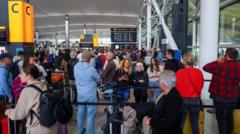Is Heathrow Ready for Another Day of Disruption After the Cyber Attack?

Published: 2025-09-21 07:55:15 | Category: technology
Air travellers across Europe are currently facing significant disruptions due to a cyber-attack that has affected check-in and baggage systems at several airports, including Heathrow. This incident has resulted in hundreds of flight delays and cancellations, with airlines resorting to manual check-in processes. The issue stems from the Muse software provided by Collins Aerospace, which facilitates shared check-in desks and boarding gates for multiple airlines. As of now, the exact cause of the disruption remains unclear, and affected airports are actively working to restore normal operations.
Last updated: 25 October 2023 (BST)
Impact of the Cyber-Attack on Air Travel
The recent cyber-attack has created a ripple effect across several major European airports, causing extensive delays and operational challenges. Here's a brief overview of the situation:
- Heathrow Airport has reported significant delays, with 47% of departing flights affected on Saturday.
- Brussels Airport has asked airlines to cancel half of their departing flights due to the ongoing issues.
- Dublin Airport expects to maintain a full schedule despite technical difficulties.
Key Takeaways
- Several European airports are facing operational disruptions due to a cyber-attack targeting check-in systems.
- Heathrow has experienced significant delays but is managing with a backup system for British Airways.
- Manual check-in is being conducted at impacted airports, leading to long queues and cancellations.
- The National Cyber Security Centre is collaborating with relevant authorities to assess the situation.
- Airlines are advising passengers to check flight statuses directly with their carriers.
Understanding the Software Disruption
The cyber-attack appears to have specifically targeted the Muse software developed by Collins Aerospace, which is integral for managing check-in processes across multiple airlines within the same airport. This system allows airlines to share resources, making operations more efficient. However, when this system fails, it leads to widespread disruption as seen in recent events.
What Happened?
On Saturday, the disruption became apparent as various airlines reported failures in their check-in and baggage processing systems. Affected airports had to revert to manual check-in procedures, leading to extensive queues and passenger frustration. The situation escalated as Brussels Airport requested airlines to reduce their flight schedules by 50% until the issue can be resolved.
Current Airport Responses
Airports and airlines are scrambling to manage the fallout from the cyber-attack, with varying responses depending on the specific airport’s capabilities and the extent of the software disruption.
Heathrow's Response
Heathrow Airport has acknowledged the delays and has been working to minimise disruptions. British Airways has been able to operate normally using a backup system, while other airlines have struggled. Airport staff have been deployed to assist passengers, and the airport has advised travellers to check flight statuses prior to arriving.
Brussels Airport's Measures
Brussels Airport has taken a proactive approach by drafting in extra staff to help manage manual check-in processes. They have already reported cancellations and are preparing for further disruptions. Passengers have been urged to arrive early and remain patient due to anticipated long queues.
Dublin and Berlin Airports
Dublin Airport, while facing similar technical issues, expects to operate a full schedule, with airlines continuing manual check-in procedures. In contrast, Berlin Brandenburg Airport has encouraged travellers to utilise online or self-service check-in options to alleviate congestion at the desks.
The Impact on Passengers
The disruptions have had a profound impact on travellers, many of whom have experienced long wait times and missed connections. Reports of passengers waiting for hours to check in have emerged, highlighting the challenges faced during this incident.
Passenger Experiences
Lucy Spencer, who attempted to check in for a Malaysia Airlines flight, was left waiting for over two hours. Similarly, Monazza Aslam expressed her frustration over the delays impacting her elderly parents, ultimately leading to a missed connecting flight. These experiences reflect the broader chaos that has unfolded at affected airports.
Industry Reactions and Future Implications
The aviation industry is closely monitoring the situation, recognising the vulnerabilities exposed by this cyber-attack. The National Cyber Security Centre has been actively involved, working alongside Collins Aerospace and various airports to understand the full impact of the incident.
Historical Context
This is not the first time the aviation sector has faced disruption due to cyber-related incidents. A similar event occurred last July, when a faulty software update caused widespread grounding of flights across the US. Analysts have pointed out that such incidents underscore the sector's increasing dependency on technology and digital systems, raising concerns about security and operational resilience.
What’s Next?
As efforts to restore normalcy continue, airports are advised to implement additional security measures to prevent future cyber threats. The need for robust contingency plans and systems capable of operating independently of centralised software is becoming increasingly apparent. As the situation unfolds, updates regarding the resolution of these issues are anticipated from Collins Aerospace and the affected airports.
Conclusion
The ongoing cyber-attack and its impact on air travel highlight the importance of cybersecurity within the aviation industry. As travellers continue to face disruptions, it’s critical for airports and airlines to enhance their security measures and ensure that contingency plans are in place. The situation remains fluid, and the aviation community will be watching closely to learn from this incident and improve future responses.
With the rise of digital systems, how prepared do you think the aviation industry is to handle cyber threats? #AviationDisruption #CyberSecurity #TravelUpdate
FAQs
What caused the disruption at European airports?
The disruption was caused by a cyber-attack affecting the Muse software developed by Collins Aerospace, which is used for check-in and baggage processing at several airports.
Which airports are most affected by the cyber-attack?
Heathrow and Brussels airports are among the most affected, with significant flight delays and cancellations reported. Other airports, including Dublin and Berlin, are also experiencing operational challenges.
How are airlines managing the situation?
Airlines are resorting to manual check-in processes and deploying extra staff to assist passengers. Some airlines, like British Airways, are using backup systems to continue operations.
What should passengers do if their flight is affected?
Passengers are advised to check their flight status directly with their airline and arrive at the airport early due to potential delays and long queues at check-in.
What measures are being taken to resolve the cyber-attack?
The National Cyber Security Centre is collaborating with Collins Aerospace and affected airports to understand and resolve the issue as quickly as possible.



